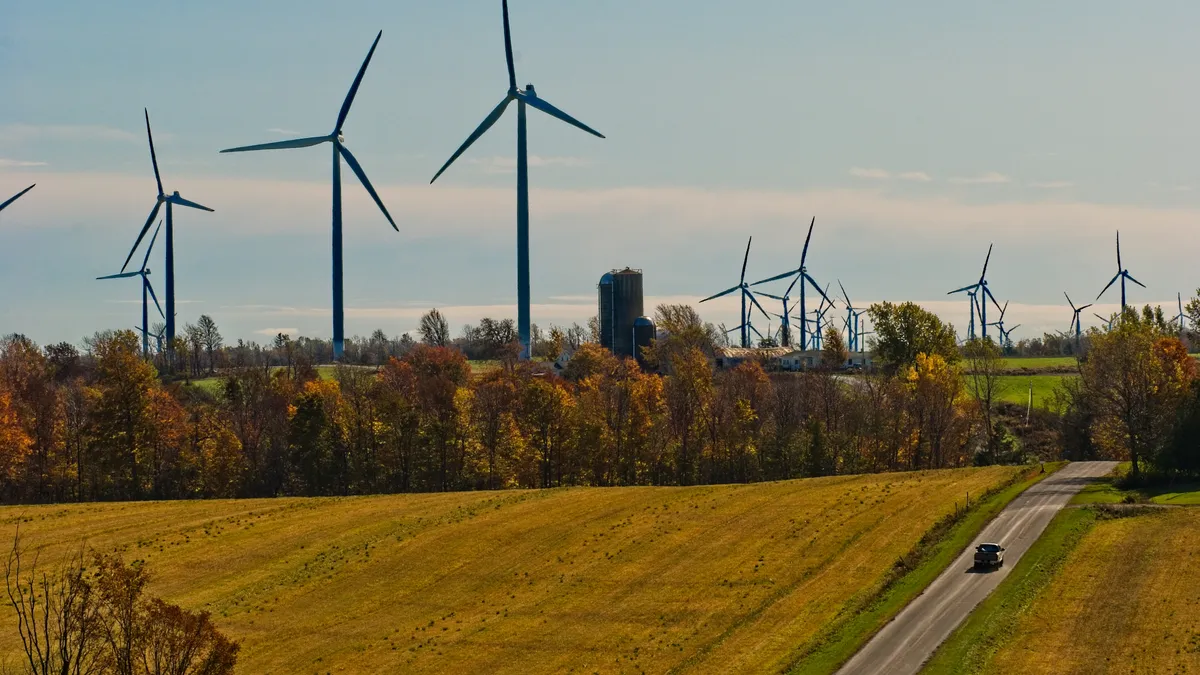Dive Brief:
- Proposals to increase prices in existing offshore wind and onshore renewable energy contracts in New York could increase residential electric rates by 2.5% and 1.5%, respectively, or a combined $4.67 a month, according to the New York State Energy Research and Development Authority.
- However, failing to update the prices for wind and solar contracts could kill the projects, leading to delays in meeting state clean energy targets, increasing carbon dioxide emissions, and potentially higher prices for future contracts, the agency said in a Monday filing at the New York Public Service Commission.
- Reflecting drivers behind the proposals, Ørsted, one of the petitioners, on Tuesday said it faces about $2.35 billion in impairments on its U.S. offshore wind portfolio related to supply chain challenges, the possible failure to be eligible for extra federal investment tax credits and higher interest rates.
Dive Insight:
The PSC is considering petitions to adjust contract terms for 91 renewable energy projects totaling 13.5 GW that would supply nearly 25% of New York’s load in 2030, according to NYSERDA, which is responsible for procuring clean energy to meet state requirements.
New York aims to get at least 70% of its electricity from renewable energy resources by 2030 and have 9 GW of offshore wind by 2035. In comments on the petitions, NYSERDA said that all existing, contracted and awarded renewable generation accounts for 66% of the state’s 2030 forecast load.
Generally, the petitions contend renewable energy developers faced unexpected inflation, supply chain constraints and a jump in interest rates since they entered into the clean energy contracts.
Without price increases, the projects may not be viable, according to petitions from Equinor and bp, which are jointly developing three offshore wind projects, Ørsted, which is also developing an offshore wind project, the Alliance for Clean Energy New York, called ACE NY, a renewable energy trade group, and Clean Path New York, a combined transmission and generation project designed to bring renewable energy to New York City.
On average, offshore wind developers are seeking a 48% increase in their contract prices to $167.25/MWh and a petition from the Alliance for Clean Energy New York asked the PSC to increase onshore wind contract prices by 71% on average to $115.66/MWh and solar prices by 63% to $102.22/MWh, according to NYSERDA.
Project cancelations would lead to delays in renewable energy procurement, potentially increasing costs for consumers, NYSERDA said, noting that certain factors indicate that average bid pricing in future renewable energy solicitations is likely to be higher than earlier solicitations.
Bid prices for onshore projects received in April and offshore offers received on Aug. 24 are “significantly higher” than past solicitations, the agency said. “There is a substantial risk that bid pricing will not decrease significantly in the near to medium term.”
NYSERDA suggested various options the PSC could consider if it doesn’t want to adopt the petitioners’ proposals, such as using inflation formulas that as part of the agency’s most recent clean energy solicitations.
A group of New York utilities urged the PSC to reject the petitions or, if it would be less costly to ratepayers, make limited changes to the contracts on a project-by-project basis.
Making the proposed contract changes would set a damaging precedent for future NYSERDA solicitations and encourage clean energy developers to discount risks when making bids for their projects, according to the utilities, which included Central Hudson Gas & Electric, Consolidated Edison Co. of New York, New York State Electric & Gas, Niagara Mohawk Power, Orange & Rockland Utilities and Rochester Gas and Electric.
In comments on the ACE NY petition, the New York Department of State’s Utility Intervention Unit, which represents consumers, urged the PSC to screen pending projects to find the most viable ones and then consider adjusting the contract prices for those projects.
“The adjusted prices should produce outcomes that are clearly beneficial to the consumers of New York,” the unit said. “The focus should be on adjusting only those hard costs and financing costs that have increased and absolutely no adjustment should be given to the developers’ overhead costs.
Clean energy developers have been asking utility regulators across the U.S. to provide relief from inflation including in California, Connecticut, Hawaii, Indiana, Maine, Maryland, Massachusetts, Michigan, New Jersey, New Mexico and Rhode Island, according to NYSERDA.















